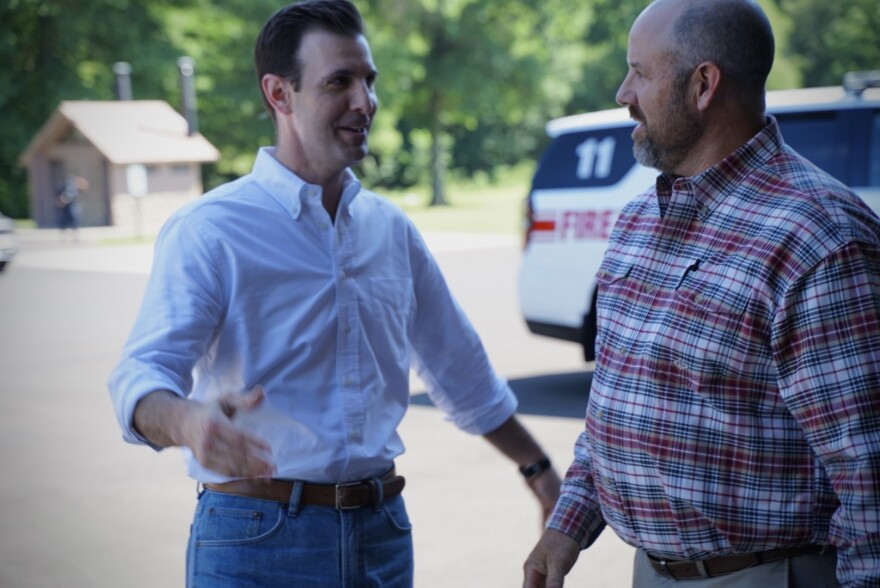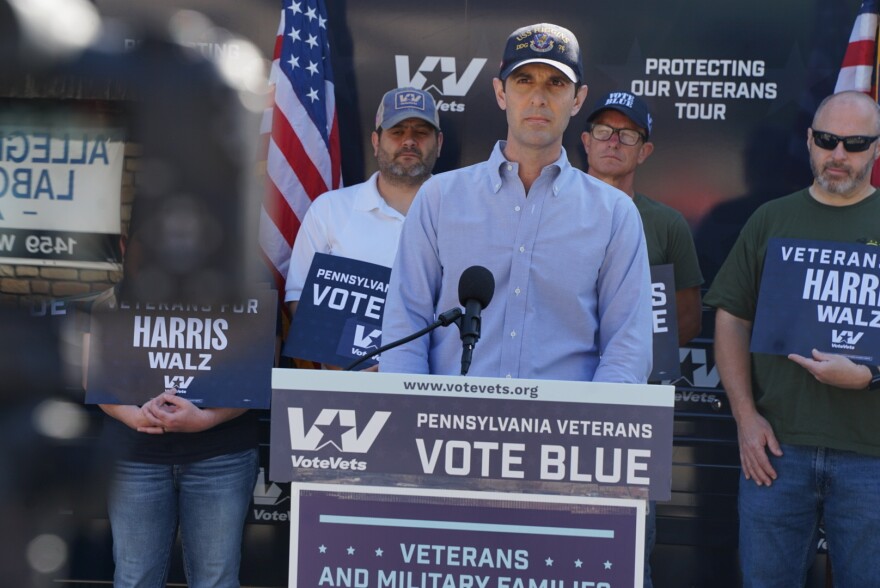When Kamala Harris and Tim Walz showed up to campaign in Beaver County in August, Rep. Chris Deluzio was there to rip on Donald Trump’s tax cuts and abortion record.
“This man tried to overthrow our constitution on January 6th. They tried to rip up what we know as our republic,” Deluzio said. “And yet we held the line. How we hold the line in terms of what happens in western Pennsylvania, turns on what happens right here in Beaver County.”
When Donald Trump’s campaign opened an office in Beaver County on June 15, by contrast, Deluzio’s Republican opponent in the 17th congressional district wasn’t there.
It wasn’t for lack of a fired-up base: Several “WITCH HUNT” posters were displayed on the windows as more than 100 local Republicans came out to rally the troops. And Beaver County Sheriff Tony Guy railed that Democrats had weaponized law enforcement “from the Department of Justice to the FBI to every other agency. … I don't believe we can trust them like we used to.”
Republican Rob Mercuri has been keeping such rhetoric, and Trump himself, at arm’s length.
While Mercuri told WESA he planned to vote for Trump – “I support Trump’s agenda,” he said – the former president’s name doesn’t appear on his website, and Mercuri hasn’t appeared at Trump’s nearby rallies. The only time Mercuri mentioned Trump on social media was in reference to the assassination attempt in Butler County.

Guy agreed with Deluzio on the importance of Beaver County: “Trump wins Pennsylvania if counties like Beaver County have big turnouts” was how he put it. And while the area had long been dominated by Democrats, it’s grown steadily more conservative – to the point where Republicans outnumber registered Democrats in Beaver for the first time.
But Republicans must weigh that against the fact that the other part of the 17th District – which contains four of every five votes cast in it – is made up of Pittsburgh-area suburbs in Allegheny County. And that area has been moving away from the GOP since Trump’s first ballot appearance in 2016.
While the race in the 17th District has attracted little local attention, the national Cook Political Report has labeled it one of the nation’s most evenly divided districts. It straddles communities that represent weaknesses for each party: affluent suburbs repelled by Trump on the one hand, working-class and rust-belt communities alienated by Democrats on the other. And it offers a case study in how politicians reach out to voters who’ve been drifting away from their party – without alienating their base.
A tale of two voters
Jarrod Corrie of Alquippa was having a drink at the Paradise Pub in Center Township one Friday in July. No small city mirrors the voting trends in Beaver County more closely than Center. In 1992 it backed Bill Cliton over George H.W. Bush by 30 points … only to see Trump beat Clinton’s wife, Hillary, and Joe Biden by 17 points a couple dozen years later.
Corrie doesn’t always like how Trump behaves, but plans to vote for him anyway: “I didn't like his demeanor and his words,” he said. “But you can't argue with the shape of the economy back then.”
Corrie is a union member who fixes heavy equipment in local mills.He attends an evangelical church, and believes Democrats are pushing a socially liberal agenda in schools. He’s voted for Republicans like George W. Bush, and his parents have voted Republican for as long as he can remember.
Lara Putnam, a historian at Pitt who studies political dynamics outside of urban cores, said that family history reflects broader changes.
“The boom time for most communities in Beaver County was 50 to 70 years ago,” she said.
Without an influx of younger, more diverse voters in the mix, she added, “you've got a much older population, you've got a less diverse population. … The electorate is composed more and more of people who've been voting Republican all their lives.”
Trump deepened this trend, she said, in part because even as he became more extreme on issues like immigration, he moderated the party’s position on issues like Social Security and Medicare – which many older working class voters see as part of the safety net.
Trump “basically made a sort of populist economic pitch, that in places like Beaver County made him a lot more palatable to sometimes-Republicans/sometimes-Democrats,” Putnam said.
The landscape looks different from Pine Township, a prosperous northern Allegheny County suburb 20 miles from Center.

While Mercuri lives in the traditionally deep-red community, it’s swung nearly 36 points away from Republican presidential candidates between 2012 and 2020. It’s not hard to hear reasons why, even at a community event like the Sept. 14 grand opening of a new library.
“Trump does not represent anything that the former Republican Party used to represent,” said Hilary Walczak. “There are great moderate Republicans who now are labeled as left-wing radicals by their own party.”
Walczak was raised conservative Chrisitan and voted Republican for most of her life. But under Trump, she said, the GOP stopped being fiscally conservative and became “racist and crazy.”
“They want to ban books in libraries and things like that. And that's just unacceptable,” she said. “That's not freedom.”
Walczak looks back warmly on Republican 2012 presidential nominee Mitt Romney – who Trump and his supporters often attack. ”I don't think Mitt Romney was a terrible person,” she said. “He just ran against Obama and never had a chance.”
In fact, Romney is the only Republican presidential candidate since at least 1992 to receive a majority of the vote in what is now the 17th congressional district. Thousands of voters in once reliably Republican suburbs shifted to Clinton in 2016 – and the move away from Trump was twice as large in 2020.
In many such communities, “People who had been independents became Democrats,” Putman said. “People who had been Democrats became full-throated vote-twice-every-year Democrats. And people who had been Republicans became split-ticket voters.”
Many of those voters are turned off by Trump’s stance on immigration, or his attacks on trans children. It’s not that voters are seeking “the leftmost position on this,” she said. “There's just skepticism about culture wars rhetoric.”
“The kind of Republican who's going to be most persuasive in the Trumpiest parts of Beaver County is literally Donald Trump,” Putnam said. “That is not going to be what's going to be persuasive for Franklin Park voters.”
Those two forces roughly balance each other out nationwide and in Pennsylvania, where polls show the electorate is evenly divided.
In the 17th Congressional district, that shift has slightly favored Democrats. Democrat Conor Lamb, who won a slightly more conservative configuration of the district as a Democrat in 2020, said both candidates are taking a studied approach to the campaign.
“There's people who put in years and years at a steel mill or in a building trades job or even as a staff worker at a hospital or health clinic … every day with very little recognition,” Lamb said. “And that's kind of what I see [Deluzio] doing. He's not a publicity hound. He's not provoking needless controversies just to get attention.”
Meanwhile, Lamb sees Mercuri pitching himself as a more moderate voice to pull back Republicans repelled by Trump.
“You just sort of be Mitt Romney and you'll get all Trump's votes,” Lamb said. “Plus maybe a handful of other swing voters who felt like they had to vote for Kamala but they don't want to have a fully Democratic ballot.”
Deluzio and Mercuri have much in common. Both attended prestigious military academies – the Naval Academy and West Point, respectively – and later served tours in Iraq. Neither has an extensive voting record: This is Mercuri’s second term as an elected official and Deluzio’s first. Both currently serve in the minority party in their chamber, which means they have little sway over legislation.

But there are contrasts. Deluzio has defended the right to abortion, while Mercuri has attended marches against it. Deluzio supports the “PRO Act,” which unions hope will make it easier for workers to organize. Mercuri says the bill would make it harder to become an independent contractor. Mercuri has attacked the Biden administration’s economic record, while Deluzio defended Biden even as he was being pressured to drop out of the campaign.
And while they are each trying to win one of the country’s most ideologically balanced districts, they arrived at the 2024 campaign from very different directions.
'It makes a big difference in someone's life'
Deluzio has spent a lot of time in Darlington: The Beaver County borough is just across the Ohio border from where a Norfolk Southern train derailment caused a chemical spill last year. Since then, Deluzio has secured federal grants to help pay for water filtration, and been a leading advocate of bills to improve rail safety.
“The tracks run all over this district,” he said.
Voters in Darlington are heavily conservative. But Deluzio’s spent more time on rail safety than just about any other issue, and he’s earned some goodwill with appearances like a July announcement that the town would receive $3.6 million in aid to expand their drinking water options.

“I do like Chris,” said Michelle Joy, a Republican council person in nearby Big Beaver Borough. “He’s helped” – without ever asking her party affiliation.
Joy wasn’t sure who she would vote for for President this year, but said she was open to Deluzio. “It's very important that we come together as Americans first.”
Deluzio has seen first-hand how hard that can be. When he first arrived in D.C., it took several days and 15 rounds of voting for Republicans to pick a Speaker of the House.
“This had never happened before. And I'm sitting there waiting to get sworn in like everyone else,” Deluzio said.
Lamb, his predecessor, got to vote on historic bills that provided trillions of dollars of funding for infrastructure, manufacturing and COVID relief. Deluzio has emphasized his efforts to help constituents back home. That meant doing things like helping people get their passports, social security checks and VA disability claims. And it meant helping small towns and local police and fire departments secure federal funding.
“Maybe it’s not the thing that catches the headlines but I think it makes a big difference in someone's life,” he said.

On a recent Thursday, Deluzio was driving off to the rural suburb of West Deer, where he was scheduled to celebrate federal funding he helped bring in for a local fire department. He had to return a library book for one of his children first — he handles responsibility for breakfast and other duties when home from Washington — but he wasn’t expecting everyone to be waiting.
“One thing I've learned in Congress is, I'm a Navy guy and I'm on time, and nobody's on time for anything in Washington,” he said.
West Deer is the kind of place that is increasingly difficult for a candidate like Deluzio. Over a quarter-century ago, voters here split evenly between Bill Clinton and Bob Dole: Today they routinely back Republicans by 20 percentage points or more. But a handful of firefighters and journalists did arrive for the event, the kind of small press conference with a giant check that Deluzio has packed his schedule with.
Deluzio says he prioritizes local events and local media over the concerns of national outlets. And when national issues arise — like when a reporter at the West Deer event asked about a recent school shooting — Deluzio frames Democratic arguments in language meant to appeal in the 17th.

Noting that he “had the training to carry weapons of war,” that many other gun owners lack, he said, “I represent a region where a lot of folks are hunters and gun owners, who I think understand we can take some reasonable steps to keep us safer.”
When it comes to some economic policies like the proposed sale of US Steel, meanwhile, Deluzio can sound more like Trump than Mercuri does.
Mercuri, along with a handful of local Republicans and business leaders, has backed the firm’s intention of being acquired by Nippon. He argues that Nippon’s job and investment promises could help the region. It's a rare public break with Trump from Mercuri, a former PNC Bank vice-president.

Deluzio, for his part, sided with the United Steelworkers, who say the deal doesn’t provide enough long-term job assurances. And he’s backed protectionist trade measures that have some things in common with Trump’s approach — part of a union-focused "Make Stuff Here" manufacturing agenda.
When Trump won the presidency in 2016, Deluzio said, he talked “about things like bad trade deals that for too long, both parties were more than happy to sign,” he said. “When you aren't also paying attention to places like Western Pennsylvania and jobs around here, a demagogue on the right will exploit that.”
'Finding common ground'
Mercuri and his wife, Kelsey, recently went to chat up voters at a community event in Aspinwall, an Allegheny River town and the kind of place Mercuri likely needs to win some split-ticket votes.
Mercuri was taking the fight directly to Deluizo, who until recently lived in Aspinwall, and to the community itself: Aspinwall backed Hilary Clinton and Joe Biden by margins of 30 and 40 percentage points.
One of the first people Mercuri bumped into was a woman who thanked him for helping her access Social Security benefits for her two children on the autism spectrum. “Your office helped me out, I got everything resolved,” she said.
Mercuri mentioned that in this year’s state budget, “We ended up getting a nice raise for direct support professionals this year, which they needed for years.”

“The work that I did in education is what I'm most proud of,” Mercuri told WESA.
That’s the right tone to strike, says Republican Jeremy Shaffer, who ran unsuccessfully against Deluzio two years ago and is now seeking the state House seat Mercuri is vacating.
District voters “want safe communities,” Shaffer said. “They want good jobs. They want low taxes. They want quality schools. They want good roads and bridges. And actually, these are things that Republicans and Democrats can work together to deliver on.”
Shaffer said the 7-point loss of his own 2022 Congressional bid stemmed from unpopular Republicans at the top of the ticket, like staunchly conservative gubernatorial nominee Doug Mastriano. While Shaffer said he benefited from some split-ticket voting, “That wasn't enough because Doug Mastriano lost the 17th Congressional District by 26 percentage points.”
Mercuri has joined with deeply conservative causes in the past. When he ran for the state House in a solidly conservative 28th district, he highlighted his religious background, conservative values and “pro-life” stance on abortion. A Deluzio ad faults his support for a state House bill which would bar abortions after a fetal heartbeat is detected, and which could result in jailing doctors who perform abortions.

Mercuri pushed back against that claim in one of only two TV ads he’s paid for: “I oppose criminalizing abortion because demonizing women over health care choices isn’t right,” he said. He’s said he would not support national legislation to restrict abortion, instead allowing states to fight it out for themselves.
Deluzio and congressional Democrats originally booked more than three times as much ad time as Republicans did. But national Democrats canceled their spending in recent weeks — a move seen as a sign of confidence in Deluzio’s chances — and Mercuri has received some last-minute support from a conservative Super PAC. So Deluzio’s advantage on the airways will be relatively small, and overall ad-spending in the race is down by more than 75% from 2022, according to data compiled by AdImpact.
(Update: The Republican-aligned Super PAC The Eighteen Fifth Four Fund canceled all the air time it had booked in the race, leaving Deluzio with a roughly two-to-one spending advantage on ads, according to AdImpact.)
Conor Lamb said fundraising is another area where Mercuri is vexed by having Trump at the top of the ticket. For donors, he said, “You don't even know if your guys win, if they would have any influence in a Trump world. Trump's allegiances are so erratic and nontraditional.”
And in fact, Trump’s only prominent appearance in Mercuri’s campaign has been a “plague on both your houses” TV ad featuring footage of a 2016 debate between Trump and Hillary Clinton. “I remember kind of shooing my kids out of the room” when the debate aired, he told WESA before the ad ran. “And I thought to myself: This is not healthy for our country.”
When Mercuri posted the ad to his campaign Facebook page, one of his followers asked, “I took this as a dig on Trump … was this your intention?” There was no reply.

Mercuri said he disagrees with Trump’s “tone and tenor,” and pledges to practice more civil politics. “Finding common ground means identifying the things that we all care about and then talking about those things, right?”
Mercuri isn’t offering much to voters who worry about the actions Trump might take in office. When asked whether he would have voted to impeach Trump for his actions on January 6, he said it was an “unfair” and “divisive” question.
“I think a lot of people are saying, ‘Let's not look back. Let's move forward together on policy solutions,’” Mercuri said. “I'm not going to rewind the tape and kind of play out different hypotheticals.
“When things need to be said, I will say them,” he added. “But being the example that I want to be in the public space is a case-by-case basis.”
Lamb, who criticized his Republican colleagues during an impassioned speech on Jan. 6, said he, too, went to Washington hoping to change it by setting a personal example. Mercuri, he said, “could succeed with that attitude. But probably not until Trump is long gone.”






